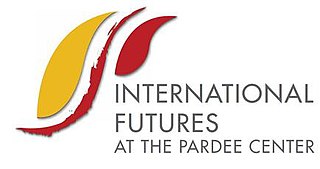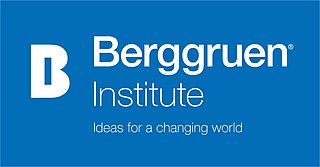Related Research Articles
A think tank, or policy institute, is a research institute that performs research and advocacy concerning topics such as social policy, political strategy, economics, military, technology, and culture. Most think tanks are non-governmental organizations, but some are semi-autonomous agencies within government or are associated with particular political parties, businesses or the military. Think-tank funding often includes a combination of donations from wealthy individuals and personal contributions, with many also accepting government grants.

The Brookings Institution, often simply called Brookings, is an American research group founded in 1916. Located on Think Tank Row in Washington, D.C., the organization conducts research and education in the social sciences, primarily in economics, metropolitan policy, governance, foreign policy, global economy, and economic development. Its stated mission is to "provide innovative and practical recommendations that advance three broad goals: strengthen American democracy; foster the economic and social welfare, security and opportunity of all Americans; and secure a more open, safe, prosperous, and cooperative international system."

The Centre for International Governance Innovation is an independent, non-partisan think tank on global governance. CIGI supports research, forms networks, advances policy debate and generates ideas for multilateral governance improvements. CIGI's interdisciplinary work includes collaboration with policy, business and academic communities around the world. Until September 2014, CIGI was headquartered in the former Seagram Museum in the uptown district of Waterloo, Ontario. It is now situated in the CIGI Campus, which also houses the CIGI Auditorium and the Balsillie School of International Affairs (BSIA).
The Global Policy Forum (GPF) is an international non-governmental organization founded in December 1993 and based in New York and Bonn .[1] The aim of the Global Policy Forum is to critically accompany and analyze developments in the United Nations and on the topic of global governance. Thereby a bridge between the international and the local level is to be built. GPF seeks to strengthen intergovernmental organizations and promote multilateralism based on solidarity, international law and the United Nations Charter. The Global Policy Forum also has consultative status on the United Nations Economic and Social Council. Jens Martens has been the GPF's executive director since 2014 and director of GPF Europe since its foundation in 2004.[2]

The German Development Institute / Deutsches Institut für Entwicklungspolitik (help·info) (DIE) is one of the leading think tanks for development policy worldwide. This has been attested in January 2013 by the ranking of the Global Go To Think Tanks Report : For the fifth consecutive time, DIE has been selected as one of the Top Ten influential think tanks and research institutions in the field of development policy worldwide. The German Development Institute / Deutsches Institut für Entwicklungspolitik (DIE) is one of only three European research institutes ranked in this Top Ten list. DIE improved its visibility in the international context in the current ranking on a wide scale, such as in the categories Top Think Tanks in Western Europe, Top Think Tanks – Worldwide and Best Government Affiliated Think Tanks. Once again, DIE belongs to the Top 20 institutions among the Think Tanks with the Most Innovative Policy Ideas/Proposals. Furthermore, DIE was evaluated in a number of categories for the first time, e.g., within the category Think Tanks with Outstanding Policy-Oriented Research Programs) or in the field of knowledge marketing. The Institute is based in the UN-City of Bonn. DIE builds bridges between theory and practice and works within international research networks. The key to DIE’s success is its institutional independence, which is guaranteed by the Institute’s founding statute.
Jennifer Welsh is a Canadian writer, consultant, and professor, specializing in the field of international relations. Welsh has a Bachelor of Arts in Political Science and Economics from the University of Saskatchewan (1987). Welsh was named a Rhodes Scholar (1987) and completed a Master's and Doctorate in International Relations from the University of Oxford (1987-1992). From 1999 to 2014, Welsh was a professor in International Relations at the University of Oxford, where she also co-founded the Oxford Institute for Ethics, Law and Armed Conflict. From 2014 to 2019, Welsh was the chair in International Relations at the European University Institute (Florence), where she directed a five-year European Research Council project on the ethics and law of contemporary armed conflict. Welsh currently works as the Canada 150 Research Chair in Global Governance and Security at McGill University, is the Director of the Centre for International Peace and Security Studies and a co-director of the Canadian Research Network on Women Peace and Security. She is also a professor at the Max Bell School of Public Policy in Montreal, Quebec, and is a frequent commentator in Canadian media on foreign affairs.

The Academic Council on the United Nations System (ACUNS) is a professional association of scholars, practitioners, institutions, and individuals active in the work and study of the UN. ACUNS stimulates and supports dialogue and research about issues of global concern and international cooperation.
Edward C. Luck was an American professor, author, and expert in international relations. He served as the United Nations Secretary-General’s Special Adviser on the Responsibility to Protect between 2008 and 2012, appointed at the Assistant Secretary-General level. He was replaced by Jennifer Welsh of Canada. Previously he was Vice President of the International Peace Institute as well as the director of the Center on International Organization of the School of International and Public Affairs at Columbia University. He also served as Dean of the Joan B. Kroc School of Peace Studies at the University of San Diego between 2012 and 2013. From 2015 to 2021 Luck was the Arnold A. Saltzman Professor of Professional Practice in International and Public Affairs at the School of International and Public Affairs at Columbia University. He also served on the International Advisory Board of the Global Centre for the Responsibility to Protect.

The Hertie School is a private independent graduate school for public policy, international affairs and data science located in Berlin's Friedrichstraße. It is a public policy school and is accredited to confer master's and doctoral degrees. Half of the students in the Hertie School come from abroad, and the working language is English.
Daniel Kaufmann is the president emeritus of the Natural Resource Governance Institute (NRGI), which resulted from the merger of the Revenue Watch Institute – Natural Resource Charter. He is also a nonresident senior fellow at the Brookings Institution, where he was previously a senior fellow, and until July 2019 served in the international board of the Extractive Industries Transparency Initiative and in a number of advisory boards on governance, anti-corruption and natural resources and has also been in high-level expert commissions such as at the Organisation for Economic Co-operation and Development, the Inter-American Development Bank and the Mo Ibrahim Foundation. Prior to that, he was a director at the World Bank Institute, leading work on governance and anti-corruption. He was also a senior manager and lead economist at the World Bank, writing and working on many countries around the world, and was a visiting scholar at Harvard University. He has also served in other boards and councils in the past, including at the World Economic Forum.

International Futures (IFs) is a global integrated assessment model designed to help in thinking strategically and systematically about key global systems housed at the Frederick S. Pardee Center for International Futures. Initially created by Barry B. Hughes of the Josef Korbel School of International Studies at the University of Denver in Colorado, the model is free for public use in both its online and downloadable forms.
Ann Florini is Clinical Professor at the Thunderbird School of Global Management at Arizona State University, where she creates programs for the hub in Washington DC. She is faculty lead for Thunderbird's executive Master of Arts in Global Affairs and Management, a DC-based one-year professional masters launching in January 2020. For the 2018–2019 academic year she was Visiting Professor at the University of Maryland School of Public Policy. Until June 2018 she was Professor of Public Policy in the School of Social Sciences at Singapore Management University, where she was Academic Director of the Masters of Tri-Sector Collaboration, and was Non-resident Senior Fellow at the Brookings Institution in Washington, DC.

The United Nations University Institute on Comparative Regional Integration Studies (UNU-CRIS) is a Research and Training Institute of the United Nations University (UNU). Based in Bruges, (Belgium) since 2001, UNU-CRIS specializes in the comparative study of regional integration and the provision of global and regional public goods, including environmental stability, poverty reduction, peace and justice.

The Center on International Cooperation (CIC) is a foreign policy think tank based at New York University that works to enhance multilateral responses to global problems, including: conflict, humanitarian crises, and recovery; international security challenges, including weapons proliferation and the changing balance of power.; and resource scarcity and climate change.

The Balsillie School of International Affairs (BSIA) is a centre for advanced research and teaching on global governance and international public policy, located in Waterloo, Ontario. As one of the largest social sciences initiatives in Canada, the school is a collaborative partnership between the University of Waterloo, Wilfrid Laurier University, and the Centre for International Governance Innovation. The BSIA is an affiliate member of the Association of Professional Schools of International Affairs, a group of schools that educate leaders in international affairs. The BSIA is housed in the north and west wings of the CIGI Campus. Admission to BSIA is highly selective.

The Institut Barcelona d'Estudis Internacionals (IBEI) is an interuniversity research institute and postgraduate education center located in Barcelona, established in 2004 as a joint initiative between the Barcelona Centre for International Affairs and five universities in the Barcelona metropolitan area, as a center of excellence in international studies. The President of the Institute is Narcís Serra, former Minister of Defense and former Vice President of Spain, and the Director is Jacint Jordana, Professor of Political Science at the Pompeu Fabra University.

The Willy Brandt School of Public Policy is a public institute for research and education in the field of public policy at the University of Erfurt. It was established in 2002, offering the first German study program leading to a Master of Public Policy (MPP) degree. The program has been accredited and reaccredited by ACQUIN. The working language is English. Until November 2009, the school was named Erfurt School of Public Policy (ESPP).

The International Institute for Sustainable Development (IISD) is an independent think tank founded in 1990 working to shape and inform international policy on sustainable development governance. The institute has three offices in Canada - Winnipeg, Ottawa, and Toronto, and one office in Geneva, Switzerland. It has over 150 staff and associates working in over 30 countries.
Multistakeholder governance is a practice of governance that employs bringing multiple stakeholders together to participate in dialogue, decision making, and implementation of responses to jointly perceived problems. The principle behind such a structure is that if enough input is provided by multiple types of actors involved in a question, the eventual consensual decision gains more legitimacy, and can be more effectively implemented than a traditional state-based response. While the evolution of multistakeholder governance is occurring principally at the international level, public-private partnerships (PPPs) are domestic analogues.

The Berggruen Institute is an independent think tank aimed at reshaping political and social institutions in the face of the great transformations of the 21st century. The Berggruen Institute works across cultures, disciplines and political boundaries, engaging great thinkers to develop and promote long-term answers to the biggest challenges facing humanity today.
References
- ↑ About GPPi: Global Public Policy Institute (GPPi)
- ↑ "History: Global Public Policy Institute". www.gppi.net. Retrieved 2015-10-27.
- ↑ "Tokyo Foundation: 2025年の世界のために現在すべきことは何か―「GGF2025プログラム」報告会".
- ↑ "Brookings Institution, The future of arms control, Internet governance, and geoengineering".
- ↑ "Global Governance Futures – Robert Bosch Foundation Multilateral Dialogues".
- ↑ Global Norm Evolution & The Responsibility to Protect